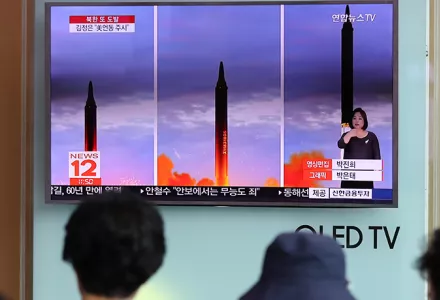Have We Trivialized Disarmament?
Speaker: Ronald Lehman, Lawrence Livermore National Laboratory
Speaker: Ronald Lehman, Lawrence Livermore National Laboratory

A quarter of a century after the golden age of arms control at the end of the Cold War, international arms restraint is experiencing “The Big Chill” of uncertainty and vulnerability. As the international security architecture weakens, nuclear rhetoric and provocative demonstrations from Moscow and Pyongyang aggravate feelings of insecurity and vulnerability. In this shrill environment, some see the new treaty banning nuclear weapons as a means to cut the “Gordian Knot” of disarmament. Others see it as a symptom of the problem. Rapid political and technological change complicate solutions, but a better understanding of the emerging world may offer an opportunity to unfreeze polarized positions and enhance the security of the United States and its allies.
The Honorable Ronald F. Lehman II is the Counselor to the Director of Lawrence Livermore National Laboratory. Lehman is also the Chair of the U.S. Department of Defense Threat Reduction Advisory Committee (TRAC) and recently co-chaired the National Academy of Sciences' study on the future of Cooperative Threat Reduction. Since 1996, Lehman has been the Chairman of the Governing Board of the International Science and Technology Center, a 39-nation intergovernmental organization.
Lehman was Director of the U.S. Arms Control and Disarmament Agency from 1989 to 1993, when START I, START II, the Chemical Weapons Convention, Conventional Forces in Europe. Open Skies, and other historic agreements where concluded. Previously, he served in the U.S. Department of Defense as Assistant Secretary for International Security Policy, in the State Department as Ambassador and U.S. Chief Negotiator on Strategic Offensive Arms (START I), and in the White House as Deputy Assistant to the President for National Security Affairs. He has also served on the National Security Council staff as a Senior Director, in the Pentagon as Deputy Assistant Secretary, on the Senior Professional Staff of the U.S. Senate Armed Services Committee, and in Vietnam commissioned in the United States Army. In past years, he served on the Presidential Advisory Board on Proliferation Policy, on the State Department's International Security Advisory Board, as chair of the NATO High Level Group, on the governing board of the U.S. Institute of Peace, and as a U.S. representative to a number of United Nations disarmament and review conferences.
Lehman formerly co-chaired the Policy Advisory Group on nonproliferation for the U.S. Senate Foreign Relations Committee. He was on the Defense Science Board Task Forces on Globalization and Security, on Tritium, on Global Strike, and on Defense against Biological Weapons. He is currently on the National Research Council Committee on U.S. Air Force Strategic Deterrence Military Capabilities in the 21st Century and served on the National Research Council's Committee on Science, Technology, and Health Aspects of the Foreign Policy Agenda of the United States and on its Committee on Alternative Technologies to Replace Anti-Personnel Landmines. He was detailed to the Administrator of the National Nuclear Security Administration as counterterrorism coordinator after the September 11, 2001, attacks. For the Department of Energy he was the U.S.-Snezhinsk Working Group Co-Chair for the Joint Russian-American Steering Committee on the Nuclear Cities Initiative. He served on the advisory panel for USSTRATCOM's Global Innovation and Strategy Center. He was on the Council on Foreign Relations Independent Task Force on the U.S. Nuclear Posture. He was a Public Affairs Fellow at the Hoover Institution on War, Revolution, and Peace at Stanford University and an Adjunct Professor at Georgetown University. He received his Ph.D. from Claremont Graduate University (1975) and his B.A. from Claremont McKenna College (1968). He is on the Board of Governors of the Keck Center for International and Strategic Studies at Claremont McKenna College, having served previously as its Board Chair. For many years, he was the Director of the Center for Global Security Research at LLNL.
He will be speaking as a private citizen.